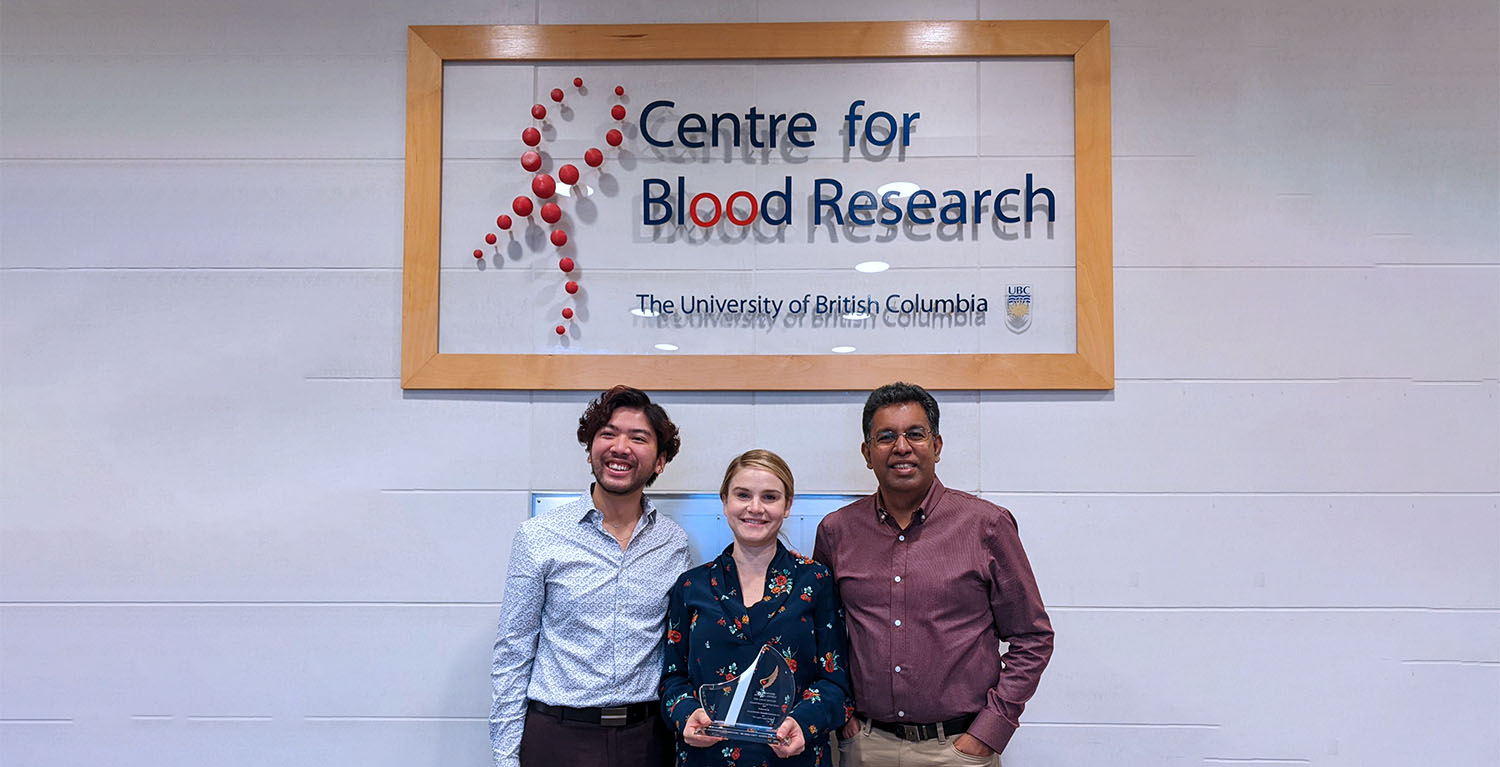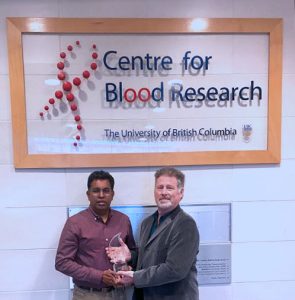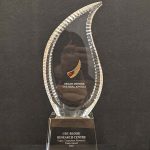
Recipients of the Logan Boulet Humanitarian Award 2021 holding the award. (Left to right: Daniel Luo, Dr. Erika Siren, Dr. Jayachandran Kizhakkedathu)
Researchers from the Kizhakkedathu Lab were recently honoured with two awards, for the impact of their work on advancing organ transplant technologies.
Dr. Jayachandran Kizhakkedathu, Dr. Erika Siren and Daniel Luo received the Logan Boulet Humanitarian Award 2021, while the Organ Transplant Innovation and Research Team Award 2021 was presented to the Centre for Blood Research at UBC and accepted by Dr. Kizhakkedathu.
Award representative Rodney Staff presented both honours, on behalf of the Angels Legacy Project from the Dawne Switenky Memorial Foundation, a Saskatchewan-based group that supports respectful organ donations.
“It was eye-opening to be recognized by an organization like this,” said Dr. Kizhakkedathu, the Principal Investigator of the lab. “Publishing a paper on our study was great, but it’s really the community recognition that reinforces the importance of transplantation research, for people and society.”
Published this year in Nature Biomedical Engineering, the researchers developed a special coating to coat blood vessels on an organ to be transplanted. The coating substantially diminished rejection of transplants in mice, and the researchers hope that their work will one day improve quality of life for transplant patients and also improve the lifespan of transplanted organs.

Rodney Staff (right) presents Dr. Jayachandran Kizhakkedathu (left) with the Organ Transplant Innovation and Research Team Award 2021
During the awards ceremony, Staff shared the stories behind the awards. Dawne Switenky, whom the Dawne Switenky Memorial Foundation was named after, died while on the waiting list for a lung transplant. A donor herself, Dawne’s eyes were donated after her passing, and her husband – Terry Switenky, a close friend of Staff – set up the Foundation in her memory.
It was the Dawne Switenky Memorial Foundation that supported the creation of the Logan Boulet Humanitarian Award. Logan was a registered organ donor and young defenceman on the Humboldt Broncos team, who passed away following the 2018 Humboldt Bus Tragedy in Saskatchewan. His organs were donated so that 6 others could live on – a story that inspired an estimated 150,000 others to become organ donors in the following weeks, in what was called the “Logan Boulet Effect” across Canada.
Upon hearing these stories, the researchers said that the donors’ legacies were powerful and inspiring.
“Hearing about the community and personal impact of these awards has been most meaningful to me,” said Dr. Siren, a former PhD alum. “Organ donation is such a personal choice, often following a loss of life. If our research can help prolong that gift, while remaining respectful and responsible as possible to the donor and their loved ones – that’s incredibly important.”
“Organ donation is such a personal choice, often following a loss of life. If our research can help prolong that gift, while remaining respectful and responsible as possible to the donor and their loved ones – that’s incredibly important.”
— Dr. Erika Siren
Staff affirmed the impact of leaving a legacy, whether through research or organ donation. “Terry wanted to leave a legacy in the name of his wife, Dawne, and to sponsor the awards and researchers who are part of this work,” he said. “For donors, what better way to help humanity than to give something so personal to you?”
While the researchers anticipate that human clinical trials may still be several years away, they remain optimistic about the work.
“As scientists, when we have a potential solution that could improve people’s lives, it’s up to us to communicate how we can help,” said Luo, a PhD Candidate. “It’s very rewarding to see the impact our science could have on changing medicine, and changing the future of medicine.”
Read more about the research: Innovative coating for blood vessels reduces rejection of transplanted organs
- Logan Boulet Humanitarian Award 2021
- Organ Transplant Innovation and Research Team Award 2021




